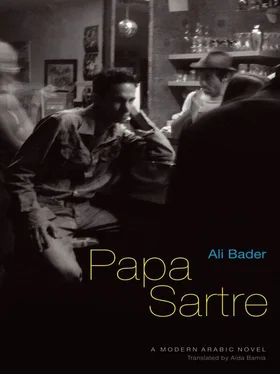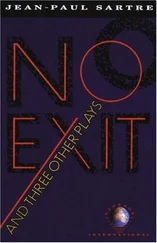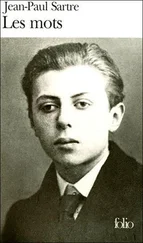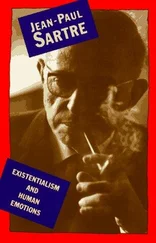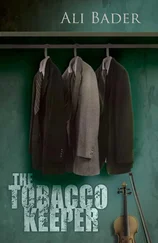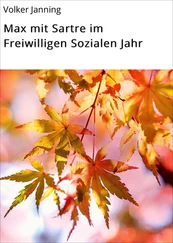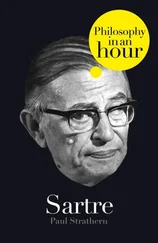I went to see Butrus Samhiri late one morning accompanied by Jawad. His office was located in Ras al-Qaryeh on the top floor of a building at the entrance to the quarter, on al-Rashid Street. Jawad looked funny, with a camera hanging around his neck and a straw summer hat tilted to one side on his head. I could not help laughing at the sight, but he responded to my laughter with a smile that seemed to say that he was feeling important for the first time in his life, or that he was proud to be undertaking an important task. I smiled back at him. I walked beside him, without looking at him, and asked, “What were you doing before working with me, Jawad?”
“I worked with my uncle Hanna,” he replied, keeping pace, his back slightly bent.
“What exactly did you do with your uncle Hanna?” I inquired as we crossed the bridge heading toward al-Mustansir Street. Jawad said, “He trusted me to do everything.” We busied ourselves looking at the jewelry shops. We saw Sabian jewelers in long gray beards holding torches with strong flames to gold rings with precious stones. There were also shops selling watches, perfumes, western clothes, and quality shoes. We took a slight turn down a narrow street toward a building with a faded red tile roof from which water dripped onto the bars of the upper windows. A huge pomegranate tree grew in the middle of the sidewalk. Its branches had damaged the telephone lines. This alley was given the name al-Adliya Street in the forties because of the large number of attorneys who had their offices in the surrounding buildings. A very tall policeman with a wide leather belt stood rigidly on the corner. His trousers were tight and pegged to the cuffs. He wore a revolver on his left side, and he held a thick billy club made of striped walnut. He stared straight ahead. When Jawad spied him from a distance he stopped short, his thick neck sinking between his shoulders, his arms and legs shaking. He opened his mouth so wide that I could see all his crooked back teeth. His eyes turned red and he breathed with difficulty. I was so surprised by his alarm that I couldn’t help but confront him, asking in a low voice, “Jawad, Jawad, what happened to you? Are you afraid of the policeman?”
“Yes, yes,” he said, hiding behind me like someone ready to bolt. I held him firmly by the hand and asked, “Why, Jawad? Have you done something wrong?”
“No, but I deserted the army.” His mustache was shaking, and he tried to lower his hat over his face as we passed the policeman, who didn’t pay any attention to us but continued to look straight ahead. We entered the vast hall of the building, where a servant was holding a bucket and mopping the marble stairs. We asked where the attorney Butrus Samhiri’s office was, and he pointed one flight up. When we reached the second floor we saw the lawyer’s nameplate before us. The office door was wide open.
The strong odor of whiskey wafted lazily through the open door. An old gramophone sat atop a square box on a dark wooden commode with elaborate old Indian designs. Old black records were piled on top of each other in an attractive way, reaching the tip of the long-necked copper horn that extended from the record player.
We were met by a plump woman of moderate beauty, perhaps in her forties. She was calm in a sort of fatalistic manner. Her face was desiccated, her body was soft in a scandalous way, and her heavy breasts swung when she moved from one spot to another. She obviously excited Jawad, who was watching her fixedly and smiled at her with his wrinkled dark face and yellowed equine teeth.
“We came to see Mr. Butrus, the attorney,” I said, bowing my head appropriately. “Do you have an appointment?” she asked. Her eyes moved from Jawad to me. “We do not have an appointment,” I said, “but tell him that Hanna Yusif sent us.” She smiled and welcomed us warmly. Her features changed, and it was clear that she knew Hanna Yusif very well — or at least the mere mention of the scoundrel’s name erased any expression of fear.
She sat us down in the comfortable armchairs in the waiting room, went into the office, and, returning with her beautiful smile, escorted us to Mr. Butrus’s office. She closed the door behind us, but Jawad could not take his eyes off the movement of her large hips. We sat facing a wall covered from top to bottom with yellow and red tiles. The other walls in the office were covered with thick mahogany panels. There was also a large, half-round balcony with colored marble at the edges. Butrus was sitting behind his desk and, due to his small size, only his head was visible. He jumped up from behind the desk to greet us, a thin, tiny man wearing a worn-out suit.
“Ahlan, Ahlan wa marhaba.” He had a speech defect, mispronouncing his r s and mixing up some words. We sat in front of him, and he looked at us with sad eyes set in a stony face. He had a pencil behind his ear like a carpenter. I said, “I came for the documents,” but he interrupted me and did not let me finish. “Yes, Hanna told me. All the documents are ready.” He turned toward the library, which was filled with files, pushed some papers aside, and placed the documents on his tidy desk. They were simple: old official documents, bank checks, and photographs that had belonged to the philosopher and his family and friends. They included two photographs of him with his friend Nadia Khaddouri, one taken in Mackenzie’s bookstore, and the other at the Orient Express café.
“Did you ever meet the philosopher?” I asked. He was staring at the half-open door of a small room from which the strong whiskey smell emanated. “Yes, I used to be his father’s agent, may his soul rest in peace. He belonged to an aristocratic family, and although the revolution brought them down, it didn’t change their standards. But Abd al-Rahman revolted against his family, even before the revolution.”
“Did you know him well?” I asked. Butrus Samhiri stared at me with a piercing look.
“Yes I did, I did. I met him more than once, but those were casual encounters. We never discussed serious topics when we met, and as a result we did not really connect.” He was silent for a moment, then continued as if he had just remembered, “I was a minor employee, a clerk, as they say. Existentialism was meaningless to me. I was more inclined toward the left, and I found Edmond al-Qushli, the Trotskyite of our time, more to my liking than the philosopher of al-Sadriya. I was not able to understand Sartre’s complicated philosophy, and I didn’t like him.”
“Did you find his philosophy complicated?” I asked.
“I don’t think that anyone in my generation understood the things he used to read. Those who said they did are liars. You can ask Salman and Abbas, if you wish. He used to meet with them in the Café Brazil.”
“But could you understand Trotsky?” I asked. Jawad was trying to take a picture, but I dissuaded him.
“Trotskyism is not a philosophy the way existentialism is. It has a practical side.” He felt uncomfortable now, and it was clear that he didn’t want to go on. He stood up and handed me the documents. “Examine these papers and if you need anything else contact me.”
I stood up. So did Jawad, who, burdened by the camera hanging around his neck, almost tripped and fell onto the sofa. “Where can I find Abbas and Salman?” I asked.
“You’ll find them in al-Camp market. Ask around; everybody there knows them. Just ask for Abbas Philosophy; they’ll direct you to them.” He turned to Jawad and asked, “Hey, Jawad, do you still catch birds on people’s roofs?” Jawad blushed and laughed maliciously. I asked Butrus how he knew Jawad.
“I know him because Hanna asked me to represent him in a few cases.” He laughed loudly, shaking his head like a devil. We left and immediately headed for the Adhamiya quarter to meet two of the philosopher’s old friends who had become merchants in Camp Raghiba Khatun market.
Читать дальше
